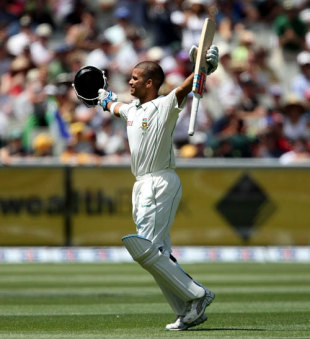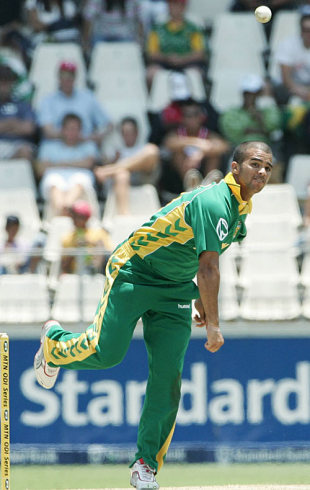For the love of Duminy
Test cricket's very first Jean-Paul is a once-in-a-generation player marked for greatness, as his feats in Australia prove
21-Jan-2009
|
|

|
Fallen in love twice this year already. Even for a stubbornly unrepentant hopeful romantic that takes some doing. True, one of these affairs lasted precisely one date (congrats, Jo, on succeeding Mushtaq Ahmed as owner of the most deceptive wrong 'un in Sussex). Fortunately the other shows every sign of blooming for some time to come - and not just for my own selfish gratification. Come on. How could you not fall head over heels for Test cricket's very first Jean-Paul?
Since January 2007 international cricket has suffered an extraordinary, almost certainly unparalleled, spate of retirements. From the Olympian (Adam Gilchrist, Sanath Jayasuriya, Anil Kumble, Brian Lara, Glenn McGrath, Shaun Pollock and Shane Warne) to the merely marvellous (Sourav Ganguly, Stephen Fleming, Jason Gillespie, Matthew Hayden, Inzamam-ul-Haq, Justin Langer, Stuart MacGill), these are all grievous losses. Throw in the ICL-enforced exits of Shane Bond and Mohammad Yousuf, add Marcus Trescothick's depression, and you have an entire tour party's worth of seemingly irreplaceable parts, in the medium-term at the very least. Seemingly.
Yet, lo and behold, over the course of those two years a galleon chockfull of young shipmates with greatness in their grasp has cruised
seamlessly, almost effortlessly, into view. Enough, indeed, to comprise a 2014 World Test XI - Gautam Gambhir, Hashim Amla, Duminy, AB De Villiers, Ross Taylor, Shakib Al-Hasan, Prasanna Jayawardene (wk), Mitchell Johnson, Dale Steyn, Ishant Sharma, Ajantha Mendis. Throw in Stuart Broad, Shaun Marsh and the Morkels and, while arguably a touch light on top-order heft, the depth of skill, flexibility and temperament would surely satisfy all but the very fussiest selector.
Of these, two stand out: Mendis, the Caliph of Carrom, for taking spin bowling into another era of mystery and wonder, and Duminy, the Strandfontein Strokemeister, for giving South Africa's overwhelming black majority their first batting superstar. This is not to denigrate or even diminish Amla and Ashwell Prince, much less Basil D'Oliveira, merely to propose that the masterclasses recently given by the lean, lissom
left-hander against Australia give every indication that, at 24, "JP" possesses that aura of once-in-a-generation specialness, that cape of superheroism worn exclusively by the elite, the blessed and the excessively fortunate.
Anyone seeking confirmation that we have a star on our hands need only reflect on his feats in Australia. So rapidly, so suddenly, has he arrived on the global radar, not withstanding that four-and-a-half-year international apprenticeship, that a refresher seems in order.
Making his five-day debut in December's Perth Test, a stand-in for the injured Prince, he shrugged off a strokeless first-innings failure with remarkable aplomb, helping de Villiers add the last 111 in South Africa's monumental chase. Languid of stroke but never of application, there was more than a hint of his hero Brian Lara.
Then came Melbourne, where he emulated Lara's appetite for the long haul. Shortly before stumps on day two the tourists were 141 for 6, the follow-on mark still 54 runs distant, yet Duminy added 43 with Morne Morkel, 67 with Paul Harris and then 180, remarkably, with Dale Steyn, a few blows shy of a new Test ninth-wicket record. By the time Duminy was last out for 166, he had occupied his sentry box for a smidge under seven-and-a-half hours, a colossal piece of concentration by any standards. How many players in their first two Tests have shown this much nerve, this much self-assurance?
| Self-control, quite clearly, is another asset for Duminy. Not bad for a bloke whose heart-rate, 220 beats per minute, is some way above the norm. Then again, Cassius Clay's heart was racing madly when he comfortably outboxed Sonny Liston to win the world heavyweight title | |||
Two modest scores followed in Sydney, but it was as if he felt that, with the series won, he was entitled to draw breath, to drink it all in, to pinch himself that this was all really happening. It was. It still is. The adaptability was soon in evidence when the pace sharpened. In the first Twenty20 his 48-ball 78, a cultured, never remotely agricultural affair, full of exquisite placements and canny angles, was six-and-a-half times the tourists' next highest score. Or a 550% improvement. However you crunch those numbers, however you express it, it was some one-man show.
In Brisbane two nights later he cracked an unbeaten 69 off 41 balls, 43 clear of the next-best contribution and accounting for almost half the runs off the bat. His ground fielding had impressed hugely in the Tests, drawing not entirely unfavourable comparisons with Jonty Rhodes, but now, at David Hussey's expense, came arguably the finest running catch seen in Australia since Steve Waugh's scampering effort to give Roger Harper a dollop of his own medicine at the MCG 20 years earlier, almost to the day. Had Duminy not misjudged a far less intimidating chance launched orbit-wards by Cameron White, South Africa might well have squared the series, but hell, nobody's perfect.
Cue the first ODI in Melbourne, where Duminy once again dragged his side from strife to vibrant life, adding 123 with Neil McKenzie and top-scoring with 71. Again, there had been no real warning. Up to then, his highest 50-over score against quality opposition had been 46 against New Zealand 14 months earlier (those three half-centuries in his previous 31 knocks had come against Kenya, West Indies and Zimbabwe). But it was the fine print that revealed the true extent of his measure: fleet enough to turn ones into twos and twos into threes, deft enough to pierce the infield gaps at will, not once did he find the boundary. Think about that. Not once. In a Test it would have been an astonishing statistic; in a one-dayer it beggared belief. Self-control, quite clearly, is another asset. Not bad for a
bloke whose heart-rate, 220 beats per minute, is some way above the norm. Then again, Cassius Clay's heart was racing madly when he comfortably outboxed Sonny Liston to win the world heavyweight title, so perhaps we shouldn't be all that surprised.
Back in Hobart, but for a needless run-out, Duminy might have hauled South Africa over the line. Moreover, his accurate, clever offspin outwitted Marsh for 78 and kept the reins tight enough to suggest that, had he bowled 10 overs instead of six, the result might have gone the other way. According to Graeme Smith, Duminy expects to take a wicket every time he comes on. Not hopes, or fancies his chances, but expects. The first man to amass 5000 runs in Tests left-handed while reeling in 100 victims right-handed? You wouldn't put it past him.
|
|

|
There was, of course, a turning point. There always is. Long identified as a gilded talent and earmarked for the very toppermost, he made his ODI debut in 2004 but was soon ditched. Eric Simons, then national coach, felt Duminy lacked hunger, not to mention the requisite attitude towards work and fitness. Jokes about the last were commonplace. "My confidence was shot," Duminy has admitted. "I didn't know if I was coming or going." Returning to the national academy, he was asked what his goals were - "I said I just wanted to enjoy the game again." A fruitful tour to Pakistan did the trick. "I got the enjoyment back into my game, and it's gone from strength to strength since then."
It was during this hiatus, reportedly, that Gary Kirsten ripped into Duminy. Not only, argued his then-Western Province team-mate, had arrogance crept in on the field, fecklessness off it was also threatening to explode his future. In Kirsten's view, as related by Robert Craddock in the Melbourne Herald Sun, the solution was unequivocal: "You have more talent in your little finger than I have in my entire body, so use it." And now he is.
Now the hunger is unmistakable. "It's always been my ambition," Duminy told the Cape Times last October, "to be the best batsman in the world." Three months later, fulfillment seems eminently possible. His main strength, Simons now contends, is humility; so long as that remains the case, he believes, the boy is simply "unstoppable". For the sake of the lad from False Bay, as well as for the whole of cricketkind, we can only hope he remains true to himself.
How sobering, then, to consider this: had Kevin Pietersen not defected/emigrated (take your pick), it is almost impossible to see how Duminy could have helped South Africa finally break their Test series duck in Australia. Sure, he might have made the one-day and Twenty20 sides, but Pietersen, Amla, Kallis and de Villiers would have filled the middle order, with Prince in reserve. Granted, Amla or de Villiers could conceivably have been promoted to open with Smith, but neither seems, as yet, to have acquired the requisite mindset. Perhaps JP should render his heartiest thanks to KP?
Rob Steen is a sportswriter and senior lecturer in sports journalism at the University of Brighton